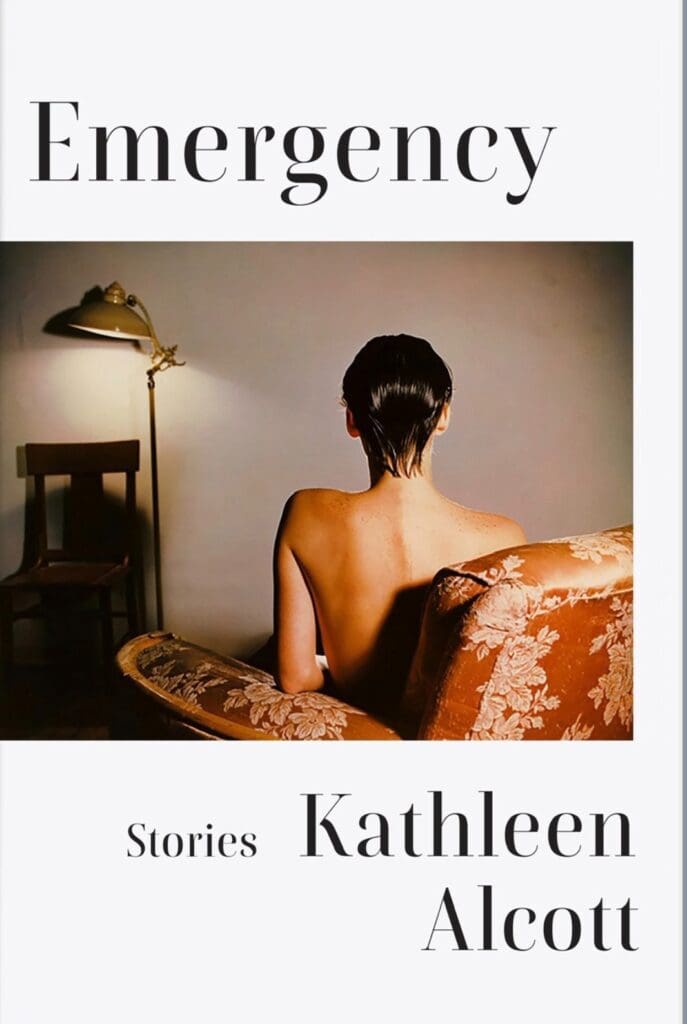In Kathleen Alcott’s Emergency (W.W. Norton; 208 pages), the tales of seven women whose lives come undone create haunting depictions of desire and harm. Alcott’s first story collection following three novels, Emergency is permeated by a sense of disaster lingering in the wings and about to unfold.
Her protagonists are typically clever and have ascended by their tenacity to the middle or upper-middle classes. Yet even in these stations they are endlessly reminded of the boundaries that do not get erased by their bank account balances. Several of them leave their homes, but often become trapped in their escapes. Sometimes the past calls—friends and family lighting up phone screens. (One character can’t bring herself to report spam sent from her dead mother’s email account.) But these connections are unsteady. Ultimately, these women are isolated in unfamiliar places with people they have chosen to know, and the distant voices are incapable of helping them.
The women in these stories struggle to fathom the male violence that infiltrates their lives. They rationalize, contextualize, and excuse the casual harms they see—or they unsee them. “This isn’t real violence,” the narrator of “Temporary Housing”—one of the collection’s most memorable stories—tells her best friend, who looks at her, “hurt enough, by a mistake so crucial.” Alcott reaches into the gap between our thinking about violence and experiencing it. When harm appears, it is an emergency, disasters that come all at once without warning. But Alcott reveals roots in childhood: “as a little boy aren’t you basically obligated to pretend at war?” Hannah asks in “Worship.” In “Temporary Housing,” the narrator reflects, “I must have suspected the point of my body was its capture. Which little girl, fed those shiny Disney VHSes, could avoid the suggestion?” She believes the American imagination is confined to only a hundred years stretch, mistakenly “indicating any person’s decades as an exception, not a pattern. There are accidents of passion, here, not designs of cruelty.”
Often the crisis has been incubated within the house; toxic and broken relationships fill this collection. People change each other, not always for the better. Some of the women are in marriages with much older men that fail when their husbands can no longer exert control. In “Natural Light,” the narrator discloses that her husband “tended to me as one might a garden, offering certain benefits and taking others away. He did not wish me to grow in just any direction.” Alcott’s women negotiate for their existence. The protagonist of “Part of the Country” lets boyfriends call her “baby” as though it were “a correction for the rest: being called something less so I’d be given something more.” After years apart, her mother tells her, “You’re bigger and you make me smaller.” Alcott’s stories find a new way to tell us an old secret: that the people closest to us have the capacity to do us the most harm.
Emergency unravels the traditional powers of beauty, youth, and intellect, revealing how they are bestowed to women by others: a partner, a friend, a parent, a stranger. The striking title story is narrated by a collective “we,” a group of women who tell the story of their recently divorced and spurned friend Helen, inviting the reader into their disparaging circle. The envy of her friends, Helen starts to question her personhood: “Her age, she must have realized then, had never belonged to her: she’d been younger or older, the thing by which somebody else felt a sense of himself.” The narrator’s boyfriend in “Part of the Country” praises her brilliance but steals her witty comments at dinner parties. Hannah, in “Worship,” articulates the crisis of identity that afflicts many of these women: “Your sense of yourself was never quite accurate. You relied on others to mention who you were at the end, at the bottom, in the dark.”
Alcott’s sentences are tightly constructed and indelible. They urge multiple readings and demand deliberation over their careful intricacies. The women in these stories hold the multiple contradictions of life in their minds at once. As the best fiction does, Emergency refuses to offer simple diagnoses for today’s social and personal conditions. Hannah longs for “the complexity of myth” to understand the effect of past traumas on the present. In “A World Without Men,” Shirley, a Los Angeles bar singer, struggles to describe her husband’s violent tendencies: “If she had gone to college, she thought, she could have explained it in a way that was tidy, but if that was the point of college, that was probably what was wrong with the country.”
Emergency bathes the reader in untidy thoughts. This is a book you must wade into, slowly immersing yourself in its murky and unsettling world.


